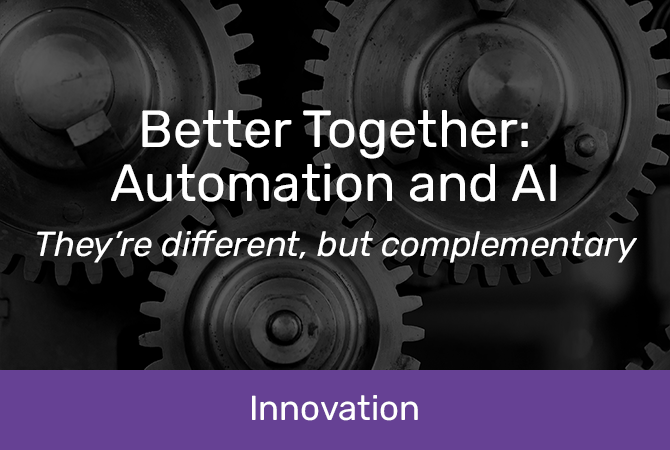Better together: Automation and AI are different, but complementary
Having worked in the AI and Machine Learning sphere for over 20 years, Datamine has noticed that people tend to have one of two reactions when they hear the words ‘artificial intelligence’:
1. The first reaction is enthusiasm - many companies are keen to hop on board with this new ‘AI’ wave and can use it as a reason for positive organisational technology adoption and change2. The second is concern- people are worried that computers are going to steal their jobs or that they’re not prepared or skilled enough for a world “dominated” by AI
The rest of this article explores how these reactions play out. While reading, think about your workplace and which is more likely to be happening. You will gain a clear understanding of what AI is and what it is and isn’t capable of.
 Automation vs AI
Automation vs AI
One of the most common misconceptions with regard to AI is its relationship with business automation. It’s easy to get confused between the two because a lot of technologies that look like AI aren’t actually AI - they’re just complex automated workflows that computers can quickly perform, speeding up and digitising a repeatable process.
Take something like customer targeting, for example: automating this activity might mean that you’re able to get the data, put into the correct format, run some rules or propensities across the customer data and use the outcomes for marketing to target customers in a smart way. All this can be done without a human needing to get involved after the initial setup.
Taking this customer targeting automation towards a transition from automation to Artificial Intelligence and Machine Learning is when the information about the success or failure of the initial process outcome is fed back into the process to make the next iteration(s) smarter or more flexible.
When you have an automated process (like customer targeting) and the market changes, that process will continue running without taking the market shift into consideration. In theory, an artificially intelligent program will more quickly adapt to the new market situation. An iterative feedback loop identifies new behaviours and changing patterns and allows the business to adjust and respond faster to market change.
In today’s world, with the current approaches and technologies, AI and Machine Learning initiatives generally work best with narrow, well-defined use cases, whereas you can automate almost any repeatable activity - assuming the inputs can be digitised. That last sentence will help you decide whether you should be working on AI or marketing automation.
AI is probably not going to take your job. Yet.
Whether you’re talking about process automation, AI or Machine Learning, it’s important to remember that computer 'intelligence' isn't the same as human intelligence. There are certain aspects of human intelligence (like sarcasm) that computers still struggle to master, and there likely always will be. The same goes vice versa - things that are incredibly challenging for humans are easy for computers (like quickly translating languages or winning at Go).
Any application is only as good as the programming, the data and the training that’s been done on it.
AI doesn’t have any ability to say, ‘This doesn’t make sense’, although it can say, ‘I can calculate the probability of an outcome based on what I’ve seen before’.
Training an artificially intelligent program to do something well requires a lot of data. Fortunately, most businesses have an incredibly large amount of data these days. That’s why large companies with access to much of the world’s data have an advantage in AI and Machine Learning. They’re able to run numerous tests and create feedback loops to help the machines learn. Smaller companies without access to the data required to run these tests and adequately train an AI application/tool will have a harder time getting these kinds of solutions off the ground. If you are a smaller business, you are better off plugging into the R&D of others to test the waters with a small pilot AI project.
If your job does not involve highly repeatable processes, it will be a while before AI can replace you – but AI can help you now. If you can identify parts of your organisation or your role that are highly repeatable, get in on the ‘AI’ action to free your time up for doing more value-add activities (this is often referred to as ‘human enablement’).
 It’s hard to implement AI; it's easy to implement automation
It’s hard to implement AI; it's easy to implement automation
There’s actually a good chance a process you’re trying to optimise through AI or Machine Learning can be solved using automation and some simple rules or calculations. AI initiatives are always preceded by automation. Automation initiatives can sometimes be converted later on into AI – the two concepts, like Datamine’s values, are better together.
If you’re trying to optimise a time-consuming task, first determine whether or not it’s repeatable. If it is, and it doesn’t require complex human judgment, it’s automatable.
If the process is too big and complex to be automated in its entirety, break it down into steps and consider them individually - could any of those steps be smarter than they currently? If so, automate those specific steps of the process. And when you have to convince management to support this work tell them you are not changing a business process, just making it more time-efficient.
Automation is your first step if you’re keen to get into the AI and Machine Learning sphere - the next step is seeking help from experts and scoping a pilot project plan. Download the Datamine Guide to Predictive and AI Modelling below to learn more or schedule a quick chat with us, experts in this field.
Further Reading
 ABOUT THE AUTHOR: PAUL O'CONNOR
ABOUT THE AUTHOR: PAUL O'CONNOR
Paul founded Datamine in 1995 and has overseen the company's growth into its current position as a key player in the data analytics community. He brings a human touch to data analysis, translating 'geek-speak' into English and never failing to turn the imponderable into actionable insights.
















































